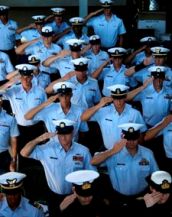Sea Legs - Leaving the Service
 To assist those members who do not choose to make the Coast Guard a career and for those retiring, the Coast Guard provides Transition and Relocation Managers (TRM) at our Health, Safety, and Work-Life Regional Practices (HSWL RP) to help make the process of transitioning to a new career easier.
To assist those members who do not choose to make the Coast Guard a career and for those retiring, the Coast Guard provides Transition and Relocation Managers (TRM) at our Health, Safety, and Work-Life Regional Practices (HSWL RP) to help make the process of transitioning to a new career easier.
Services include access to computerized job banks, resume-writing assistance, help with the interviewing process and more.
Print out your Departing the Service Checklist to help you get started.
Transitioning from the Coast Guard
All separating or retiring members must receive Pre-Separation Counseling from a TRM, their SPO or their Command. The TRM at your HSWL RP can provide you with additional information about Transition Assistance and Pre-Separation Counseling. https://www.dcms.uscg.mil/TAP.
Retirement
It is never too early to plan for retirement. To qualify for retirement, a member must serve for at least 20 years (exceptions may be made in disability cases). Retirement pay depends on the length of active duty service, pay grade and the retirement plan that is in place at the time a member enters the service. Members leaving active duty service are eligible to receive transition assistance.
A member who remains on active duty until retirement receives retired pay, commissary and exchange privileges, “space available” use of recreation and club facilities, a SBP (if elected), reduced-cost medical insurance, burial rights and more. Coast Guard members may contribute a portion of their basic and special pay to a tax-deferred retirement account called a TSP while on active duty. For more information visit www.tsp.gov.
Coast Guard Retiree Services Program (RSP)
All retirees, including their family members and survivors, are entitled to certain rights, benefits and privileges and are subject to responsibilities arising from these entitlements. Retirees, as part of the total Coast Guard workforce, remain capable of making life-long contributions to Coast Guard missions.
To ensure their contributions continue retirees must be kept apprised of changing programs, services and policies. The Coast Guard Retiree Services Program serves the Coast Guard military retirees and eligible surviving family members by keeping the lines of communication open to provide retiree information, retiree benefits advice and services.
Additional information is available at www.dcms.uscg.mil/retiree.
 Veteran’s Affairs
Veteran’s Affairs
The U.S. Department of Veterans Affairs (VA) provides patient care and federal benefits to veterans and their dependents.
Veterans of the United States armed forces may be eligible for a broad range of benefits and services provided by the VA. Some of these benefits may be utilized while on active duty. These benefits are codified in Title 38 of the United States Code. The booklet “Federal Benefits for Veterans, Dependents and Survivors” contains a summary of benefits effective January 1, 2013. www.va.gov/opa/publications/benefits_book.asp
For additional information, regarding the U.S. Department of Veterans Affairs visit www.va.gov.